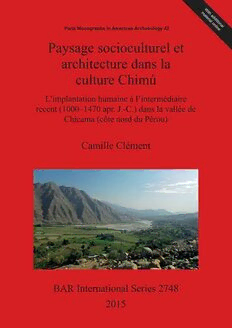
Paysage socioculturel et architecture dans la culture Chimú: L'implantation humaine à l'intermédiaire recent (1000-1470 apr. J.-C.) dans la vallée de Chicama (côte nord du Pérou) PDF
391 Pages·2015·126.273 MB·French
Most books are stored in the elastic cloud where traffic is expensive. For this reason, we have a limit on daily download.
Preview Paysage socioculturel et architecture dans la culture Chimú: L'implantation humaine à l'intermédiaire recent (1000-1470 apr. J.-C.) dans la vallée de Chicama (côte nord du Pérou)
Description:
Around the tenth century AD, the Chimú culture emerged along the arid northern coast of Peru. In the fifteenth century AD, at its peak, the Chinú kingdom expanded over hundreds of kilometres, was controlled by a network of administrative centres from Chan Chan, the capital. In this volume the analysis of settlement patterns and the exploitation of the valley of Chicama sheds light on different mechanisms that have contributed to the growth of Chan Chan, the political capital and ceremonial centre of the Chimú. Among the 167 sites identified in this region, 88 were occupied during the Late Intermediate Period (1000 to 1470 A.D.). The investigation of these sites, composed of concentrations of archaeological material, buildings and infra-structures, offers a partial view of the human settlement pattern, supplemented by previously published archaeological data. This study shows that the heart of the coastal plain of Chicama was cultivated by the local communities, for whom historical records can be found in sixteenth century archives, while in the margins, the expanding irrigation and the agriculture were managed from administrative centres relaying the authority of Chan Chan. The installation of Chimú groups from the coast upstream to the middle valley allowed for effective control the water resources, essential for the crops in an arid environment.
See more
The list of books you might like
Most books are stored in the elastic cloud where traffic is expensive. For this reason, we have a limit on daily download.
